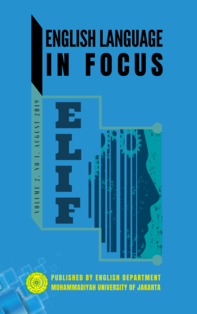Teaching Vocabulary through Fly Swatter Game
DOI:
https://doi.org/10.24853/elif.2.1.17-24Keywords:
fly swatter, game, vocabulary.Abstract
The study aimed to find out whether fly swatter game can give influence toward students’ vocabulary mastery. The subject of this study was grade VII-2 of SMPN 9 Tangerang Selatan in the academic year of 2018/2019, which consisted of 42 students. The method used in this study is a quantitative method with the design of the pre-experimental study. The data from pre-test and post-test were analyzed statistically using spss 16. The result of this study showed; the students’ pre-test mean score was 45.4 and the students’ post-test mean score was 86.6. The result of t-test was 21.55 and significant (2-tailed) was 0.00 < p (0.05). The hypothesis (H1) was accepted, which means there is a significant difference between pre-test and post-test scores of the experimental group. It can be concluded that applying fly swatter game in teaching vocabulary to 7th grade students of SMPN 9 Tangerang Selatan is effective.References
Ahangari, S., & Abdi, M. (2011). The Effect of Pre-task Planning on the Accuracy and Complexity. Procedia - Social and Behavioral Sciences, 29, 1950–1959. https://doi.org/10.1016/j.sbspro.2011.11.445
Alqahtani, M. (2015). The Importance of Vocabulary in Language Learning and How to be Taught. International Journal of Teaching and Education, 3(3), 21–34. https://doi.org/10.20472/TE.2015.3.3.002
Muadah, A. (2019). Improving Students’ Vocabulary Mastery by Using Fly Swatter Game (IAIN Salatiga). Retrieved from http://e-repository.perpus.iainsalatiga.ac.id/5218/
Mubaslat, M. M. (2011). The Effect of Using Educational Games on the Students’ Achievement in English Language for the Primary Stage. Retrieved from https://files.eric.ed.gov/fulltext/ED529467.pdf
Nation, P. (2013). My Ideal Vocabulary Teaching Course. New Zealand.
Nor, F. M., Mazlan, M. H., & Rajab, A. (2015). Akademia Baru English Language Teachers’ Perceived Difficulty of English Skills Faced by ESL Learners. Journal of Advanced Research in Social and Behavioural Sciences ISSN, 1(1), 12–18. Retrieved from http://www.akademiabaru.com/doc/ARSBSV1_N1_P12_18.pdf
Nushi, M., & Jenabzadeh, H. (2016). Teaching and Learning Academic Vocabulary. California Linguistic Notes, 40(2), 51–70. Retrieved from https://www.researchgate.net/publication/305072985_Teaching_and_Learning_Academic_Vocabulary
Rezkiah, H., & Amri, Z. (2013). Using Fly Swatter Game to Improve Students’ Vocabulary. Journal of English Language Teaching, 1(2), 235–242. Retrieved from http://ejournal.unp.ac.id/index.php/jelt/article/download/1958/1673
Subon, F. (2016). Direct Vocabulary Instruction: The Effects of Contextualised Word Families on Learners’ Vocabulary Acquisition. Procedia - Social and Behavioral Sciences, 224, 284–291. https://doi.org/10.1016/J.SBSPRO.2016.05.461
Downloads
Published
Issue
Section
License
Authors who publish with this journal agree to the following terms:
- Authors retain copyright and grant the journal right of first publication with the work simultaneously licensed under a Creative Commons Attribution License that allows others to share the work with an acknowledgment of the work's authorship and initial publication in this journal.
- Authors can enter into separate, additional contractual arrangements for the non-exclusive distribution of the journal's published version of the work (e.g., post it to an institutional repository or publish it in a book), with an acknowledgment of its initial publication in this journal.
- Authors are permitted and encouraged to post their work online (e.g., in institutional repositories or on their website) before and during the submission process, as it can lead to productive exchanges, as well as earlier and greater citation of published work (See The Effect of Open Access).


